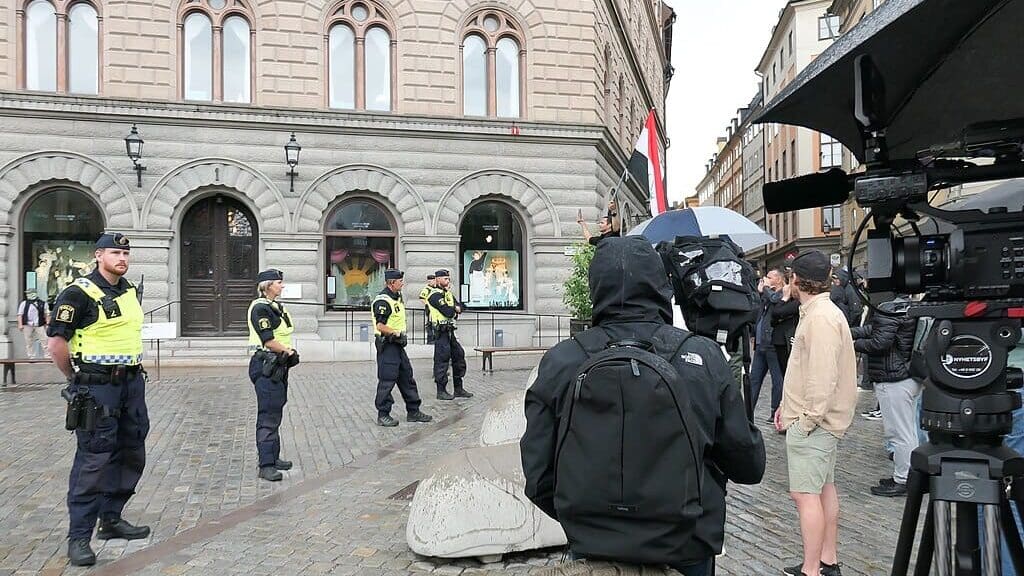The Swedish government’s latest attempt at putting a stop to Quran burnings without changing the constitution has opponents condemning the proposal as a roundabout way of limiting free speech.
After the summer of 2023 saw repeated Quran burnings and violent Muslim reactions, in Sweden and abroad, the government in September of last year appointed as “special investigator” the Director General of the Crime Prevention Council Mattias Larsson with reviewing options for banning demonstrations that constitute “a serious threat to both individuals and social order and our democracy.” The resulting report, published this month, focuses on how the government can stop Quran burnings and other Islam-critical demonstrations—the kind of expressed opinion most likely to be met with violent reactions from parts of the population.
Larsson’s report proposes a legal change that would allow a procedural one, directing police to consult Security Services as well as the Ministry of Foreign Affairs before permitting demonstrations that are judged to entail
a significant risk that crimes threatening Swedish security are committed in Sweden or against Swedish interests abroad, or that Sweden’s security is threatened in any other way.”
If the consulting agencies have qualms about it, police can deny the demonstration permit—without providing a stated reason for the denial “if necessary with regard to the protection of intelligence operations.”
The report also proposes that questionable demonstrations could be allowed, with an imposed “condition aimed at the manner of conducting the assembly.” Examples of such conditions mentioned in the report are
that a religious text may not be burned or otherwise destroyed at the assembly, or that a doll or other depiction of a country’s leader may not be handled in a disrespectful manner.
The latter caveat is a direct response to a demonstration in Stockholm in January 2023 where Kurdish activists hung a mannequin bearing the resemblance of Turkey’s President Erdoğan upside down outside city hall. The action created a diplomatic spat that delayed Turkey’s approval of Sweden’s NATO membership. An Erdoğan doll holding a rainbow flag was also used in a 2023 Stockholm Pride parade, resulting in another condemnation by Turkey.
Free speech defenders have already opposed the proposal. Dagens Nyheter journalist Owe Nilsson said in an op-ed:
In plain language: prior censorship. … The proposals are deeply problematic and constitute a serious threat to the traditionally strong protection we have for freedom of assembly and expression in this country.
There is no room for limitations on the freedoms of assembly and demonstration in consideration of national security in the law. For that, Sweden must be at war or facing the threat of war, and then only after a decision by the government.
Security Services are not thrilled with the idea either. In a comment to the special investigator, the agency said they “indirectly may be considered to dictate the conditions for freedom of expression, which is not compatible with the authority’s mission to protect democracy and safeguard citizens’ freedoms and rights.”
Special investigator Larsson, however, does not think his proposal “significantly restricts” freedom of speech: “What happens is that under certain circumstances, you are not allowed to do or say something … there’s no prohibition against saying it somewhere else.”
The chairman of the parliamentary justice committee Richard Jomshof—of the Sweden Democrats, which is propping up the government—told the daily GP that his party does not support the suggested changes:
We stand up for Swedish freedom of expression in all situations and will never accept that Islamists are allowed to set limits on what we have the right to say and do here in Sweden.
Minister of Justice Gunnar Strömmer of the governing Moderate Party, however, said the rules shouldn’t be introduced just for a specific moment but because of a lasting need to address security threats, including managing public gatherings. “The goal here is to create laws and regulations that endure over time.”
While Denmark has outright banned Quran burnings, and neighboring Finland and Norway already have ‘heresy laws’ that forbid the public destruction of religious symbols or texts, Sweden has struggled with stopping the demonstrations. An attempt by Stockholm police to prevent gatherings where the Quran was burned was overturned by the courts.
Recently, weekly pro-Palestinian demonstrations in Malmö were found by the daily Sydsvenskan to use different messaging in Swedish and in Arabic. While the Swedish signs and chants called for a ceasefire and how “people in Gaza have the right to life,” chants in Arabic called for the destruction of Tel Aviv and expressed support for the al-Qassam Brigades responsible for last year’s October 7th massacres in Israel. One of the reporters revealing the discrepancy between Arabic and Swedish slogans was subsequently threatened in her home by protesters waving Palestinian flags and shouting her name through a loudspeaker.
Whether such activism will be also considered “a threat to social order”—or whether the proposed changes are mainly aimed at pacifying Sweden’s large Muslim population— remains to be seen.






